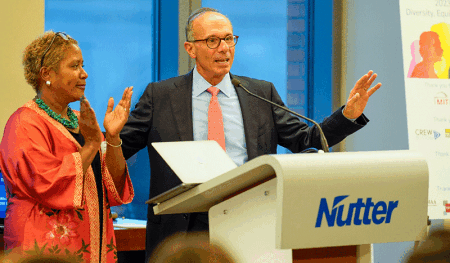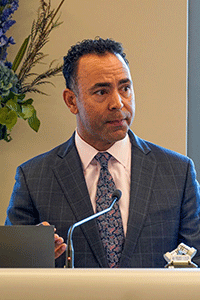ULI Boston/New England and other local partners of the CRE/DEI Collaborative—Builders of Color Coalition, CoreNet New England, CREW Boston, NAIOP Massachusetts, and all five divisions of the Greater Boston Real Estate Board as well as the Real Estate Executive Council (the national trade association for commercial real estate professionals of color)—recently gathered for the annual Boston CRE Diversity, Equity & Inclusion Summit to continue to share insights and strategies on how to advance DEI within commercial real estate meaningfully.
The CRE/DEI Collaborative was first formed in 2019 when a dedicated group of CRE professionals decided that actionable steps were needed to address the glaring lack of diversity in the Boston commercial real estate community. The various Boston CRE organizations had been working independently of each other to come up with workable solutions. Still, there was little collaboration between the organizations, according to Amanda Strong, asset management director at the MIT Investment Management Co. and one of the founders of the CRE/DEI Collaborative. “One of the things reasons that the (CRE/DEI Collaborative) is so special is because instead of all of these groups working in silos, we’re sharing information, and we’re really doing something,” she told the gathering. “And we realized that you won’t know its impact without measuring something.” So the organization established a set of clear goals:
- Foster collaboration, create impactful action, and effect meaningful and measurable change with respect to DEI in the commercial real estate industry.
- Speak effectively on behalf of the entire industry.
- Provide a safe space and forum for a sounding board regarding DEI initiatives.
- Create accountable commitments and impact through benchmarking goals.
One of the benchmarking goals was to increase the diversity of the boards of the various organizations making up its constituency. When the Collaborative began in 2020, 39 percent of the 283 board members were women, and 12 percent were people of color. By 2022, those percentages increased to 43 percent and 19 percent, respectively, and the organizations within the Collaborative have committed to increasing those percentages to 50 percent women and 25 percent people of color by 2026. Founding member Paul Ayoub, chair of Boston-based law firm Nutter noted, “What’s really remarkable about that is no one says, ‘Do you think we can meet it? Everyone says, ‘Of course, we’re going to do that.’ And that’s how the conversation has changed, and that’s the power of the Collaborative.”
The efforts of the Collaborative so far have resulted in the creation of systems to monitor progress; increased collaboration among the trade groups; continued the annual CRE DEI Summit; design and implementation of DEI training programs; and the sharing of best practices on mentoring, recruiting, and maintaining women and people of color, and promoting internships and mentorship programs for students of color.
Michelle Landers, executive director of ULI Boston/New England, shared the 10 Principles for Embedding Racial Equity in Real Estate Development developed by ULI and published in a report in the spring of 2022. The report has garnered the third most views on the ULI Knowledge Finder platform, having been read by over 10,000 individuals. The principles are listed below:
- Embed racial equity across all aspects of your real estate development practice.
- Commit to building your knowledge and optimizing your personal and institutional power.
- Articulate the racial equity business case.
- Use data to ensure equitable processes and outcomes.
- Leverage capital to drive equitable change.
- Understand and address current and historical context.
- Recognize the power of language.
- Create a community-centered development process.
- Build trust, transparency, and credibility.
- Form strong, intersectoral partnerships.
“The purpose (of the report) is to equip real estate professionals to deliver the financial and social benefits to all stakeholders, including developers, partners, communities, and cities, and the next steps,” she explained. “This is an important start, but we recognize that change requires a sustained long-term commitment.”
Taidgh McClory, a founding member of the Collaborative and founder of THM Advisors, a Boston-based firm that consults with commercial real estate companies nationally on equity and inclusion strategies, delivered the keynote address at the Summit. He began by disputing the veracity of the English proverb ‘A rising tide lifts all boats,’ particularly as it applies to his family’s history and, more broadly, to communities of color. McClory’s grandfathers were of Irish and Trinidadian descent, both WWII veterans and both lifelong employees at the General Electric plant in Lynn, Mass. While his Irish grandfather was able to buy a home and create a life that enabled him to pass on generational wealth to his heirs, his Trinidadian grandfather faced a plethora of racial inequities and lived in public housing.
“I share that story to help ground today’s discussion in a reality that challenges the notion that a rising tide lifts all boats,” said McClory. “It’s stories like it that remind us that we still live and work in an old legacy system. As we dig further into this world of multiple economic realities that lift some boats and sink others, the report reminds us that real estate is about place—but it’s first and foremost about people. When we center our strategic thinking and our decision-making around the impact that real estate and land use has on our communities and the impact that has on people, we can acknowledge that real estate does have the power to change lives in positive ways. And that is the premise that the 10 Principles report was built upon.”
The summit also included a discussion with two large firms that are putting those principles into practice—Tishman Speyer, which is developing the Enterprise Research Campus (ERC) for Harvard University, a 900,000-square-foot (83,612.7 sq m) mixed-use development in the Boston neighborhood of Allston, and the Lincoln Property Company (LPC), which is developing a 650,000 square foot (60,387 sq m) life science research and office space in the Seaport District in Boston. The capital raise for ERC included $30 million in investment from Black and Latino investors. Tishman awarded more than 30 percent of pre-construction project costs to MBE/WBEs and at least 15 percent of construction costs to MBE/WBE firms. LPC partnered with UHM Properties, a Black-owned full-service property management company, for the project, which created additional opportunities for the firm in Boston. The discussion was led by Pratt Wiley, president & CEO of The Partnership, Inc., which helps companies and institutions attract, develop, and retain talented multicultural professionals at all levels of leadership.
“We have for too long been focused on the paradigm of diversity as being charity on one hand or a tax on the other,” said panel moderator Pratt Wiley, president & CEO of The Partnership, Inc., a Boston firm that helps companies and institutions attract and retain multicultural professionals. “If you take nothing away from my time today, please let it be that diversity is good for business, and there are significant data to back it up, including the McKinsey report (which concluded in 2020, “The business case for diversity, equity, and inclusion is stronger than ever.).”
Kirk Sykes, managing director of minority-owned real estate development firm Accordia Partners, which is developing Dorchester Bay City, a $5 billion, mixed-use project that will deliver 6.1 million square feet (566,708.5 sq m) of office, research, and development space, housing, academic uses, and 15.4 acres (6.2 ha) of open space, delivered closing remarks. The former chairman of the Federal Reserve Bank of Boston gave a brief history of how DEI initiatives have slowly progressed in the City of Boston, much of which was spearheaded by the Federal Reserve.
Sykes was encouraged by the emergence of ESG investing globally approximately five years ago but has concerns about the political pushback in the U.S., as evidenced by the suit filed by 26 U.S. attorneys to block ESG investing. The suit was recently dismissed, but the push against what conservatives have branded as “woke capitalism” threatens DEI initiatives. A 2022 KPMG survey indicated that 59 percent of CEOs felt they would pause or reconsider their ESG efforts despite most employees wanting to work in a company supporting DEI initiatives.
“There is a moment of reckoning coming. I choose to be optimistic on this,” said Sykes. “I think there is a roughly $50 trillion (investment) opportunity that we need to figure out how to harness…and now we all need to figure out how to bring it home.”








